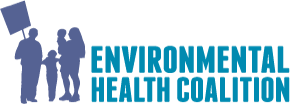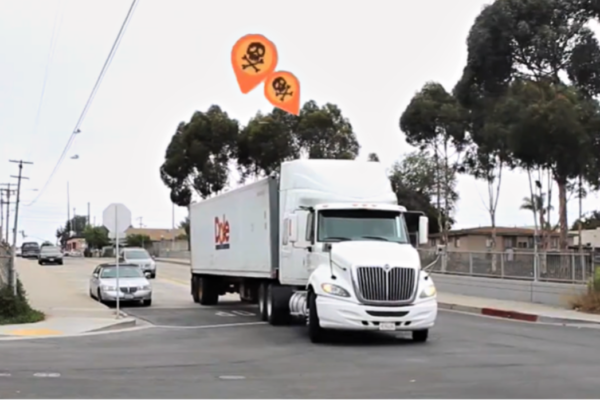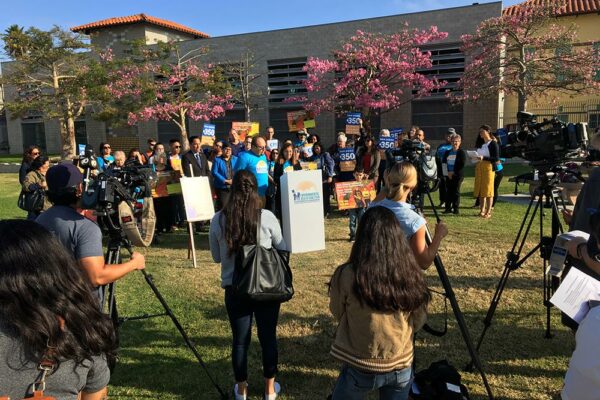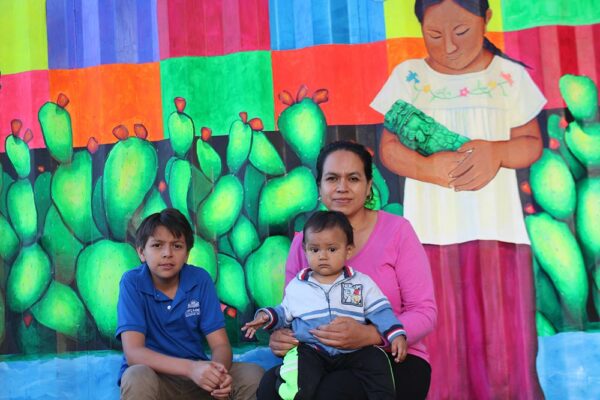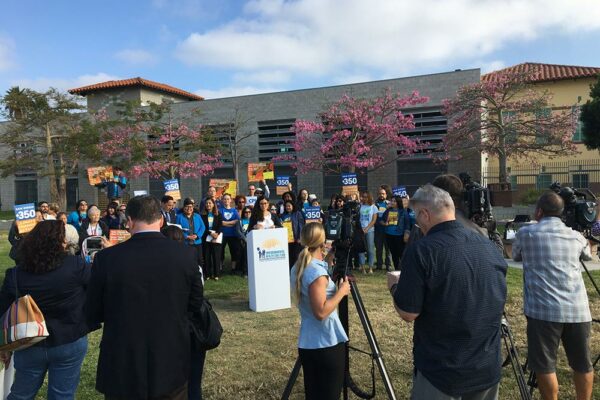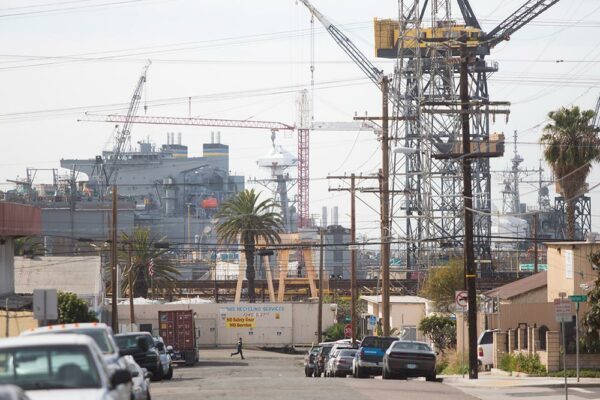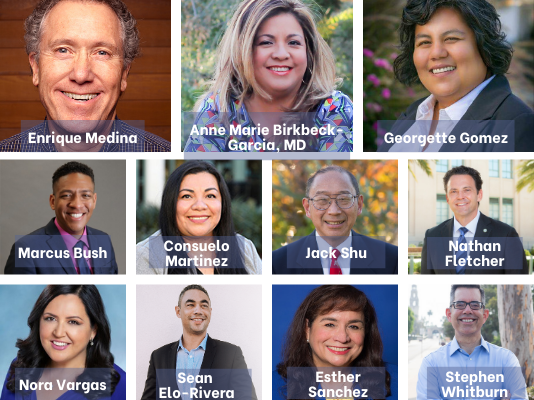Community Advocates Won Clean Air Goals, But FIGHT to FUND Equity CONTINUES
After years of advocacy, environmental justice activists celebrate San Diego’s Climate Action Plan’s ambitious clean air goals while calling for funding that prioritizes the City’s most polluted and under-resourced communities.
SAN DIEGO, CA, August 3, 2022 – During Wednesday’s City Council meeting, in a 8 to 0 vote, the San Diego City Council approved the updated 2022 Climate Action Plan (CAP). For the first time, the CAP has a clean air section that commits the City to reduce levels of diesel particulate matter (PM) by 80% from 2016 levels by 2030 with priority in most impacted communities as identified by the draft CalEnvironScreen (CES) 4.0. While celebrating the CAP’s strong clean air goals, community activists continue to push for a commitment to prioritize funding for the most under-resourced and over-polluted communities in San Diego.
“The CAP’s clean air goals are a major win for environmental justice communities because air pollution has traditionally been excluded from climate change solutions – including the City’s previous 2015 Climate Action Plan,” said Diane Takvorian, Executive Director at Environmental Health Coalition (EHC). “However, these goals will be meaningless if the CAP doesn’t prioritize funding solutions for residents breathing the most dangerous air in the City, who are also the most vulnerable to climate change.”
The CAP determines where and how the City will spend millions of dollars to combat the climate crisis. Activists from Barrio Logan, Logan Heights, and City Heights attended Wednesday’s City Council meeting demanding the CAP include stronger clean air goals and prioritize 90% of project funding in communities like theirs that need it the most.
“The air quality is impacting my health and my livelihood. I’ve suffered from chronic rhinitis since I was an infant,” said Emily Villagrana, a lifelong Logan resident. “All of us want a clean San Diego, but it is more urgent for those that are suffering the health effects. Please don’t ignore us.”
Communities like Villagrana’s breathe some of the most diesel-polluted air in the state, which causes cancer, asthma, and other chronic diseases. Diesel pollution also accelerates climate change. According to the U.S. EPA and California Air Resources Board, black carbon is up to 450 – 1,500 times more powerful at warming the climate than carbon dioxide and other well-known climate-warming gases.
In addition to breathing lung-damaging air, communities like Barrio Logan also have a severe shortage of tree coverage, cool zones, parks, and other resources that mitigate extreme heat. This combination makes them more vulnerable to the impacts of climate change – like heat waves, droughts, and smoke from wildfires.
“If you think about the City as a street of houses, and each neighborhood is a house, then the communities of Logan, City Heights, and San Ysidro are houses on fire,” said Kyle Heiskala, EHC’s Climate Justice Policy Advocate. “There is no equity without funding. It is like measuring how hot it is in the burning house without sending any resources to put out the flames. The CAP implementation must commit to funding 90% of environmental justice community projects first.”
The City Council approved the Climate Action Plan and an implementation plan with an additional council policy to inform the prioritization of climate actions is expected to come back to the City Council for approval in February of 2023.
MEDIA CONTACT:
Angelica Estrada
Communications Director, Environmental Health Coalition
562-708-3093
Angelicae@environmentalhealth.org
###ABOUT ENVIRONMENTAL HEALTH COALITION
Founded in 1980, Environmental Health Coalition (EHC) builds grassroots campaigns to confront the unjust consequences of toxic pollution, discriminatory land use, and climate change. Visit www.environmentalhealth.org to learn more.
Community Advocates Celebrate San Diego’s Transportation Plan
IMMEDIATE RELEASE
San Diego Association of Governments (SANDAG) passes the most equitable, environmentally just Regional Transportation Plan to date.
Today, SANDAG’s Board of Directors approved the 2021 Regional Plan (RTP), which will determine San Diego County’s transportation future for decades to come. The newly passed RTP provides a pathway to modernize San Diego’s transit system to reduce greenhouse gas emissions, decrease lung-damaging air pollution, and meet the needs of the low-income communities of color who have been hit hardest by the pandemic.
“The planet is burning and our current transportation system is heavily contributing to the fire, damaging our lungs, and failing the low-income communities of color who depend on it the most,” said Carolina Martinez, Climate Justice Director, Environmental Health Coalition. “93% of San Diego’s low-income residents do not have access to fast and frequent transit and the 2021 Regional Plan provides critical lifelines to change that.”
Led by the San Diego Transportation Equity Working Group, residents at the frontlines of the climate crisis in Barrio Logan, City Heights, and National City identified 10 priorities to improve the transit system- the 10 Transit Lifelines. These lifelines reflect a vision to advance affordable and frequent transit solutions that will benefit all San Diegans. Transportation justice advocates have worked for decades to advance expanded transit with little success until the last few years with the SANDAG reforms instituted by AB 805.
“Throughout the planning process, SANDAG was proactive in including our communities, as a result, the 2021 Regional Plan is the most equitable and solution-driven regional plan to date,” said Diane Takvorian, co-founder and Executive Director, Environmental Health Coalition. “The Regional Plan paves a path to make the 10 Transit Lifelines a reality.”
The 10 Transit Lifelines are:
- A Regional Plan that prioritizes environmental justice
- Youth opportunity passes
- Bus service every 10 minutes
- Build a 24-hour Blue Line Express
- 24 – hour service
- Fund the Purple Line
- An all-electric bus fleet by 2030
- Anti-displacement strategies
- Restroom access
- Emergency-ready transit system
“I’ve lost countless moments with my family waiting at bus stops, running to catch the bus, coordinating my life around our inconvenient and unreliable transit system,” said Esperanza Gonzalez, a City Heights Resident who rides the bus to work. “I used my 30 years of experience riding the bus to help develop the 10 Transit Lifelines and it is so encouraging that SANDAG listened to us and passed a regional plan that will improve the lives of working people like me.“
To learn more about Esperanza and the 10 Transit Lifelines, visit enviromentalhealth.org/transitjustice.
###
ABOUT ENVIRONMENTAL HEALTH COALITION
Founded in 1980, Environmental Health Coalition (EHC) builds grassroots campaigns to confront the unjust consequences of toxic pollution, discriminatory land use, and climate change. Visit www.environmentalhealth.org to learn more.
Barrio Logan Finally Gets A Community Plan That Protects Residents
Barrio Logan Finally Gets A Community Plan That Protects Residents
IMMEDIATE RELEASE
After more than four decades and a devastating industry-led referendum, San Diego City Council approved an update to Barrio Logan’s community plan.
Today, the San Diego City Council voted unanimously to approve a Community Plan Update for Barrio Logan that will prioritize resident’s health, air quality, and culture, while slowing gentrification. This update is more than 40 years in the making. The previous Barrio Logan Community Plan allowed polluting businesses to operate right next to homes and schools.
“Barrio Logan residents have fought for a community plan update since the 1970s,” said Diane Takvorian, Executive Director of the Environmental Health Coalition. “This update is long overdue and will help put an end to the environmental racism residents have faced for generations.”
One of only 14 California Cultural Districts designated by the state, Barrio Logan is one of the most Latino/a/x communities in San Diego and has some of the lowest median income in the City. This vibrant cultural gem also suffers from some of the worst air quality in the State. Polluting highways and industries surround it. These same industries ran a referendum in 2013 that crushed a council-approved update to Barrio Logan’s community plan, which would have separated residential areas from industry.
“I know some neighbors that have asthma, in particular children,” said Barrio Logan resident Elizabeth Chavez speaking in support of the Community Plan Update during the City Council meeting. “With this plan in place, future generations’ health won’t be at high risk for developing even worse health issues.” She was one of the more than 20 residents who spoke in support of the plan.
The 2021 Barrio Logan Community Plan Update provides even stronger environmental protections for residents than the 2013 Draft. The new update that the City Council approved will:
- Put a buffer zone between industrial and residential areas of the neighborhood
- Promote more green spaces, like parks, and tree canopy
- Preserve community culture and history
- Improve walkability and increased opportunities for safe, accessible public transit
- Require more affordable housing and prevent displacement of residents in new developments
“On top of pollution residents live with daily, they are now threatened by gentrification,” said Julie Corrales, Barrio Logan resident and Policy Advocate at Environmental Health Coalition. “Although this plan provides unprecedented gentrification and displacement protections, the community still needs more. It must be this Council’s most pressing priority in the coming year to adopt an update of the City’s Tenant’s Right to Know Ordinance that will provide more tenant protections.”
###
ABOUT ENVIRONMENTAL HEALTH COALITION
Founded in 1980, Environmental Health Coalition (EHC) builds grassroots campaigns to confront the unjust consequences of toxic pollution, discriminatory land use, and climate change. Visit www.environmentalhealth.org to learn more.
Clean Air Plan Aims to Reduce Cancer Risk for Portside Communities
FOR IMMEDIATE RELEASE: Friday, July 16, 2021
Contact:
Angelica Estrada
562-708-3093
AngelicaE@environmentalhealth.org
Clean Air Plan Aims to Reduce Cancer Risk for Portside Communities
San Diego Air Pollution Control District adopts ambitious plan to reduce cancer-causing pollution in San Diego’s portside communities.
SAN DIEGO, July 16, 2021 – A newly reformed and more diverse SDAPCD board distinguished itself on Friday from its predecessors by approving an ambitious public health-centered Community Emission Reduction Plan (CERP). In addition to reducing air pollution, the newly approved plan establishes strategies to decrease the cancer risk for communities neighboring the Port of San Diego. These portside communities – Barrio Logan, Logan Heights, Sherman Heights, and West National City – are exposed to vastly disproportionate amounts of cancer-causing air toxins.
Portside community cancer risks are as follows:
- According to EPA’s National Air Toxics Assessment, residents in the portside area have a higher risk of developing cancer from air toxins than 93% of the nation.
- Portside communities are exposed to more diesel particulate matter pollution – which is known to cause cancer – than 95% of California.
- Diesel pollution causes 84 percent of the cancer risk from air pollution in Barrio Logan and National City communities, according to the California Air Resources Board.
“Many families, including my own, have suffered both physically and financially from health complications due to the air pollution we breathe. My grandfather who lived in Barrio Logan the majority of his life passed away from lung cancer, and my mother has had to undergo two surgeries to address her respiratory problems,” said Maritza Garcia, a third-generation Barrio Logan resident. “The SDAPCD’s vote to approve the Community Emission Reduction Plan (CERP) shows that they are listening to the community and prioritizing our health. We deserve clean air just like everyone else.”
Currently, the San Diego APCD cancer risk reduction threshold is 100 per million, which – along with San Joaquin Valley – is the highest for the five large air districts in California. This means that in the San Diego region each permitted business can emit enough toxic air contaminants to put 100 people in a million at risk of developing cancer. The recently adopted CERP will work to reduce this risk down to 10 people per million people in portside communities by 2026. This is just one of 11 community health-centered goals in the plan.
“The new SD APCD board has shown great leadership and a deep commitment to environmental justice by voting to approve this aspirational CERP,” said Joy Williams, who represents the Environmental Health Coalition on the Portside Community Steering Committee, also known as the AB 617 Steering Committee. “The CERP addresses the community’s highest priorities to reduce health risks due to air pollution, such as diesel and other toxins, and increase trees and green spaces in their neighborhoods.”
The CERP includes goals to lower diesel pollution from 2018 levels by 2031 and transition medium-duty and heavy-duty trucks from diesel to 100% zero-emission vehicles five years ahead of the state requirements. Diesel pollution does not just cause cancer. It aggravates respiratory diseases like asthma and is associated with low-birth weight. Children in portside communities, like Logan Heights and National City, have more than double the rate of asthma emergency rooms visit than the county average, and triple the rate of La Jolla.
To read the entire CERP in English, click here.
To read the entire CERP in Spanish, click here.
###
ABOUT ENVIRONMENTAL HEALTH COALITION
Founded in 1980, Environmental Health Coalition (EHC) builds grassroots campaigns to confront the unjust consequences of toxic pollution, discriminatory land use, and climate change. Visit online at http://www.environmentalhealth.org.
Under Increasing Community Pressure, Port of San Diego Charts New Direction to Meaningful Clean Air Strategy
Board of Port Commissioners supports public health goals in its Maritime Clean Air Strategy
SAN DIEGO, May 14, 2021 – Portside communities have long suffered from air pollution generated by Port of San Diego operations, which causes cancer, heart disease, asthma, and other respiratory problems. On Tuesday, May 11, 2021, the Port’s Board of Port Commissioners held a virtual hearing on the Port’s draft Maritime Clean Air Strategy (MCAS), a plan that is supposed to outline how the Port will reduce the air pollution it generates and address public health in Portside communities.
A coalition of community residents, and state and local organizations led by Environmental HeaIth Coalition (EHC) mobilized in opposition to the current draft MCAS. They argued that it would maintain the status quo and not meaningfully reduce harmful air pollutants. In response, the Board directed Port staff to develop a new draft that sets specific public health goals for clean air, creates an achievable transition plan to zero emission heavy-duty trucks, while supporting economic development. The Board also asked staff to increase community and stakeholder outreach and provide a longer review and comment period.
“The MCAS as we know is a guiding document, but even as a guiding document it holds itself to be transformative on how we provide a path on encouraging sustainable economic growth that won’t be at the expense of public health,” said Port Commissioner Sandy Naranjo.
Agreeing with Naranjo, Commissioner Jennifer LeSar said, “I really believe that clean air is a civil rights issue.” She called for approaching the MCAS from a restorative lens that does not focus on just meeting minimum requirements but embraces aspirational goals that push the Port to lead.
Some commissioners called for an approach that balances public health with tenants and industry interests. While maintaining the importance of economic vitality, Board Chair Michael Zucchet reminded the commission of the Port’s imbalanced history.
“I don’t think there has been a balance. I think there has been a 100% emphasis on commerce and the maritime industry…,” said Zucchet. “…we can all think of all the ways where environmental quality, where public health has been sacrificed over the years…”
Portside communities, like National City and Barrio Logan, have some of the highest levels of diesel pollution in the region. Children in these communities have more than double the rate of asthma emergency room visits than the county average. A recent report found that over 80% of the cancer risk San Diegans breathe in is from diesel pollution.
“My husband suffers from respiratory problems and has cancer, and the pollution that comes from the port and the trucks that pass through my community every day makes his medical condition worse…,” shared Alicia Sanchez, a National City resident, during the public comment portion.
The coalition led by EHC is calling for an MCAS that 1) decreases the risk of cancer by reducing diesel and other toxic air pollutants, 2) requires heavy-duty diesel drayage trucks to transition to 100% zero-emission vehicles by 2030 – five years ahead of the state’s requirements, and 3) provides the infrastructure, funding, and implementation mechanisms necessary to achieve these goals. Over 200 community members signed a petition in support of these environmental justice goals.
“With the amount of diesel pollution our communities are exposed to, they cannot afford to wait until the state’s 2035 ZEV goal to breathe cleaner air. We need a commitment from the Port of San Diego that they will lead the state in emission reduction, not begrudgingly follow,” said Diane Takvorian, the executive director of Environmental Health Coalition. “Based on what we heard today, it looks like this new Board of Port Commissioners is listening to the community and is ready to do their part so we can all breathe clean air. We are cautiously optimistic, but we will not let up the pressure.”
Port staff is expected to produce a new draft for public review and comment, before presenting a final draft to the Board of Port Commissioners in September 2021. To watch the May 11, 2021, hearing, please click here. The MCAS is item 15.
###
MEDIA CONTACT
Angelica Estrada
Communications Director, Environmental Health Coalition
angelicae@environmetalhealth.org
ABOUT ENVIRONMENTAL HEALTH COALITION
Founded in 1980, Environmental Health Coalition (EHC) builds grassroots campaigns to confront the unjust consequences of toxic pollution, discriminatory land use, and climate change. Visit online http://www.environmentalhealth.org.
Three Public Members Join Newly Reformed San Diego Air Pollution Control District Board Ushering in a New Era of Clean Air
FOR IMMEDIATE RELEASE: Friday, April 2, 2021
Contact:
Angelica Estrada
Communications Director, Environmental Health Coalition
AngelicaE@environmentalhealth.org
Three Public Members Join Newly Reformed San Diego Air Pollution Control District Board
Ushering in a New Era of Clean Air
With the sixth worst air quality in the nation, Environmental Health Coalition is hopeful San Diego’s new Air Pollution Control District (APCD) board will take bold action to protect the health of the 3 million San Diego County Residents.
San Diego’s APCD appoints the state’s first ever-Environmental Justice Member, along with a Public Health/Physician Member, and Air Pollution Science/ Technology member.
SAN DIEGO, April 2, 2021 – Environmental Health Coalition congratulates the three public members appointed to the newly reformed San Diego Air Pollution Control District Governing Board. The three new members appointed by the Board are Anne Marie Birkbeck-Garcia, MD to the Public Health/Physician Member seat, Enrique Medina to the Air Pollution Science/Technology Member seat, and Georgette Gomez to the Environmental Justice Member seat – the very first in the state.
With these three public members, the SDAPCD Board is now comprised of 11 members tasked with improving San Diego County’s air quality to protect the health of its over 3 million residents who breathe some of the most polluted air in California and the nation. In San Diego, nearly 10% of children across the region have asthma, and children in the areas most impacted by air pollution have three to five times more than the county average in hospitalizations.
“My family has lived in Logan for a few generations and as a result, we have endured a tremendous amount of air pollution in our neighborhood. Due to this pollution, my mother has had to undergo two surgeries for her breathing problems,” said Maritza Garcia, a Barrio Logan resident. “Having an Environmental Justice member on the board that cares about neighborhoods like mine makes me hopeful to see major improvements to clean our air. Our lives depend on it.”
Gomez will be the first environmental justice member to sit on an ACPD board in the state. The immediate past president of San Diego City Council and former EHC Associate Director, Gomez has lived, worked, and represented nearly all the 40 San Diego census tracks that are the top 25% most polluted areas in the state. Most of those census tracks are south of interstate eight in low-income neighborhoods of color.
“Anne Marie, Enrique, and Georgette all deeply understand the terrible health impacts pollution has on our most vulnerable communities because of their personal experiences with it and will work to significantly improve air quality in these communities,” said Diane Takvorian, Executive Director of Environmental Health Coalition.
Raised in South San Diego, Dr. Birkbeck-Garcia is a pediatrician who treats children suffering from respiratory and other life-threatening diseases made worse by severe air pollution. An EHC board member since 2009, Medina is an environmental and occupational health and safety professional who volunteers his time and expertise in San Diego and Tijuana addressing air pollution and health issues.
“It is really exciting to see AB 423 become reality. The new SDAPCD Board is so much more representative of San Diego County’s vast and diverse population,” said Mayor Todd Gloria. “It provides a great opportunity for the Air District to get on the right track and I look forward to air quality improvements in the near future.”
In 2019, following demands from environmental justice communities to strengthen SDAPCD, Governor Newsom signed AB 423 into law. This bill – authored by then Assemblymember Todd Gloria and sponsored by EHC – sought to make the SDAPCD board more accountable, transparent and diverse.
San Diego Board of Port Commissioners Delays Consideration of Polluting Project, Responding to Community Demands for Electric Truck Requirements
December 11, 2020 – SAN DIEGO, CA – Today, the Port of San Diego delayed approval of a massive project for Mitsubishi Cement Corporation (MCC) that would increase air pollution and greenhouse gas emissions by adding up to 8,700 new diesel heavy duty trucks to Portside communities. Demands to require Mitsubishi Corporation to use clean Zero Emission electric trucks that reduce diesel air pollution to protect portside communities from continued exposures to air pollution were heeded.
Environmental Health Coalition, community residents and a growing alliance of local, state and national organizations demanded that the Port of San Diego protect the air quality and health of San Diego residents. The Port has a significant opportunity to demonstrate leadership but staff proposed a zero emission (ZE) strategy that was essentially meaningless. The only requirement is ONE demonstration electric truck, and no other measurable requirements ‘unless and until’ the Port determines that zero emission vehicle (ZEV) trucks are feasible for the project. Criteria for a finding of feasibility is not included in the proposal therefore a requirement for ZEV trucks under this strategy would likely never occur.
Vice Chair Michael Zucchet expressed support for the Mitsubishi project but not at the expense of public health. “MCC is a great addition to the Port except for one thing – the benefits all come at the expense of the community health.” Zucchet made the motion to continue the item until a proposal with specific requirements can be crafted. The motion was approved unanimously.
WHY:
The impacted communities of Barrio Logan and National City already rank in the top 5% for diesel air pollution in the state. Children’s asthma hospitalization rates are 3 times more than the county average in Barrio Logan and National City where COVID-19 infection rates are disproportionately high. COVID-19 is worse for communities with poor air quality.
COVID 19 is disproportionately affecting Brown, Black and Indigenous communities. In San Diego, Latinos account for about 34% of the population, but more than 60% of the COVID-19 cases, and County data shows a more than double rate of the virus in communities adjacent to the Port.
There is a 15% higher rate of COVID-19 mortality for communities with poor air quality and that are directly impacted from high fossil fuel emissions, like Portside communities with high diesel emissions.
References: Summary of Harvard studies; European Society of Cardiology study
QUOTES:
- “It’s time to stop diesel death zones. The Port of San Diego did the right thing – stopping a 200% increase in dirty, deadly diesel trucks.” Diane Takvorian, Executive Director, Environmental Health Coalition
- “More trucks will increase traffic and will worsen the air quality. I have a son with asthma and that worries me a lot.” Margarita Garcia, National City resident
- “As families affected by environmental pollution, we have the right that our kids and that elderly folks have better air quality and stop being predisposed to so many illnesses, just for being people who have lower incomes.” Eva Trapero, Barrio Logan resident
CONTACT INFORMATION:
Interviews available: To coordinate interviews, Angelica Estrada at (562) 708-3093 or
AngelicaE@environmentalhealth.org
OPPOSITION:
Nearly 600 individuals have signed a petition demanding zero emission trucks 29 Organizations have signed onto opposition letter so far, including:
- National Nurses
- United San Diego Coastkeeper
- UNITE HERE Local 30
- Asian Pacific Environmental Network
- Coalition for Clean Air
- Climate Action Campaign
- SanDiego350
- Communities for a Better Environment
- South Ward Environmental Alliance
- Urban & Environmental Policy Institute | Occidental College
- New Jersey Environmental Justice Alliance
- Moving Forward Network
- BIKESD
- The Greenlining Institute
- The San Diego LGBT Community Center
- Sierra Club San Diego Chapter
- Sierra Club NCG Conservation Committee
- NAACP North San Diego County
- Environmental and Climate Justice NAACP NSDC
- Environmental Center of San Diego Endangered Habitats League
- Escondido Neighbors United
- Chicano Park Museum and Cultural Center
- Barrio Logan MAD
- SWIA
- San Diego Audubon Society
- Sunrise Movement San Diego – Partnership Lead
- Center on Policy Initiatives
- Mothers Out Front
###
ABOUT ENVIRONMENTAL HEALTH COALITION
Founded in 1980, Environmental Health Coalition (EHC) builds grassroots campaigns to confront the unjust consequences of toxic pollution, discriminatory land use, and climate change. Visit online at http://www.environmentalhealth.org.
Environmental Health Coalition Celebrates 40 Years of Environmental Justice Victories
August 20, 2020 – SAN DIEGO, CA – Today, Environmental Health Coalition (EHC), will celebrate 40 years of community-led environmental justice (EJ) in the San Diego/Tijuana region. EHC’s 40thAnniverary Celebration will take place online due to COVID-19. The event will broadcast free at 5:15 PM (PST) today on YouTube (English) and Facebook (Spanish), featuring a keynote address from the renowned environmental and climate justice leader, Elizabeth Yeampierre. San Diego County Supervisor Nathan Fletcher will kick off the online festivities, which also feature the launch of a new video and spoken word poetry.
Over the past four decades, EHC has won many difficult battles confronting the unjust and racist consequences of toxic pollution, discriminatory land use, and climate change. Frontline communities are now facing challenges as never before: coping with a deadly pandemic, skyrocketing unemployment, lack of health care, and systemic racism. In response, EHC is stepping up its commitment to fighting environmental racism and championing public health for the next 40 years and beyond.
“In 1980 when EHC began our journey, environmental racism was not on the environmental agenda, so people of color in the most impacted communities put it on the country’s agenda,” reflected Diane Takvorian, EHC’s executive director. “We have made incredible progress but our journey is far from over. The next decade will be the most transformative with the phase-out of fossil fuel; creation of land use plans that center equity and health and ensuring that environmental justice leaders become decision-makers at every level.”
EHC and local community leaders have been the driving force behind many seminal environmental justice victories in the San Diego/Tijuana region. These range from the landmark adoption of Community Right to Know laws in 1982 and the Mexico/US agreement to clean up Metales y sus Derivados in 2004 – to the approval of the Westside Specific Plan in National City in 2010 and the passing of California Assembly Bill 423 in 2019 to democratize the San Diego Air Pollution Control District Board.
“The work of EHC has helped transform San Diego and elevate our environmental justice issues,” said San Diego County Supervisor Nathan Fletcher. “Congratulations on four decades of important work to address air quality, environmental justice, and being a forceful advocate for our communities.”
Resident leaders and community members have played a critical role in every EHC campaign, as part of a Community Action Team, as Promotoras, and EJ Weavers, balancing a persistent commitment to environmental justice with work, family responsibilities, and often-serious health issues. Since 1980, countless resident leaders, spanning three generations, have emerged from the communities where EHC works.
“I have grown up with the Environmental Health Coalition and we will keep fighting for environmental justice for many more years,” shared Vannesa Hernandez, a member of EHC’s youth group in Tijuana, Mexico, Grupo de Jóvenes del Colectivo Salud y Justicia Ambiental.
For more information, please contact Bari Samad at 619-343-6509 or
baris@environmentalhealth.org
###
ABOUT ENVIRONMENTAL HEALTH COALITION
Founded in 1980, Environmental Health Coalition (EHC) builds grassroots campaigns to confront the unjust consequences of toxic pollution, discriminatory land use, and climate change. Visit online at http://www.environmentalhealth.org.
California Strategic Growth Council awards Environmental Health Coalition $200,000 for Transformative Climate Communities Program in Barrio Logan
June 26, 2020 – SAN DIEGO, CA – The California Strategic Growth Council (SGC) has awarded Environmental Health Coalition (EHC) a $200,000 planning grant for community-led development and infrastructure projects in Barrio Logan. SGC’s Transformative Climate Communities (TCC) grant funds projects that achieve major environmental, health, and economic benefits in California’s most disadvantaged communities. The EHC project, Tierra, Cultura y Salud: A Plan to Protect and Preserve Our Barrio Logan, is supported by funds from California Climate Investments – Cap-and-Trade Dollars at Work.
“The Environmental Health Coalition built the Tierra, Cultura y Salud planning project on the type of robust community collaboration that we know brings success,” said California Strategic Growth Council Executive Director, Louise Bedsworth. “We’re proud to award this Transformative Climate Communities planning grant to EHC and look forward to supporting this community-driven planning process as it comes to life in San Diego.”
Since 2019, EHC has convened a community-driven process with Barrio Logan stakeholders and local community partners to become more resilient in the face of gentrification, displacement, pollution, poor air quality, and resulting health problems like asthma. The TCC planning grant will address these issues through a thoughtful community engagement process on issues such as affordable housing, increasing urban green spaces, reducing greenhouse gas emissions, and improving public health.
“We are honored to receive the TCC planning grant from SGC and eager to get to work with our partners in Barrio Logan to start implementing the program,” said Barrio Logan resident and EHC Policy Advocate, Julie Corrales. “Community leadership development is a core EHC value and the TCC program is a perfect fit because it empowers local communities most impacted by toxic pollution to choose their own goals, strategies, and projects.”
EHC will work with project partners including the Chicano Park Museum & Cultural Center, Chicano Federation, Logan Avenue Consortium, Barrio Logan Association, Urban Corps of San Diego, and the City of San Diego to achieve the following TCC program objectives:
- Achieving Significant Reductions in Greenhouse Gas Emissions
- Improving Public Health and Environmental Benefits
- Expanding Economic Opportunity and Shared Prosperity
“I am pleased that the California Strategic Growth Council has chosen the community of Barrio Logan to receive its Transformative Climate Communities Planning Grant,” noted San Diego City Councilmember, Vivian Moreno. “I look forward to a healthy collaboration between all community partners, including the Environmental Health Coalition, to determine how best to maximize the funding from this grant and help transform our community for future generations.”
The Tierra, Cultura y Salud project will launch in Fall 2020 and includes planning two affordable housing initiatives, conducting a study for a Community Land Trust, developing an urban greening plan including a public park on Boston Avenue, and funding an environmental justice exhibit at the Chicano Park Museum and Cultural Center.
EHC extends a special thanks to the Greenlining Institute for their invaluable technical support and strategic analysis in developing our grant application.
For more information, please contact Bari Samad at 619-343-6509 or baris@environmentalhealth.org.
###
ABOUT ENVIRONMENTAL HEALTH COALITION
Founded in 1980, Environmental Health Coalition (EHC) builds grassroots campaigns to confront the unjust consequences of toxic pollution, discriminatory land use, and climate change. Visit online at http://www.environmentalhealth.org.
Kresge Foundation awards $100,000 planning grant to Environmental Health Coalition to build climate resilience, improve health
SAN DIEGO, August 27, 2019 – The Kresge Foundation has awarded Environmental Health Coalition (EHC) a $100,000 planning grant to advance policy solutions aimed at improving climate resilience and equitably reducing health risks in low-income communities. EHC is one of 15 community-based nonprofits nationwide receiving grant funding as part of the planning phase of Kresge’s Climate Change, Health and Equity initiative.
EHC has been fighting for social and environmental justice in the region’s low-income communities of color for nearly 40 years. With this funding, EHC will work with partners Center on Policy Initiatives, San Diego 350, and City Heights Community Development Corporation to develop multi-year work plans that address community-defined health and climate priorities.
“San Diego’s environmental justice communities continue to carry a greater burden of the harmful effects of climate change,” said Carolina Martinez, policy director at EHC. “We are deeply grateful to the Kresge Foundation for this grant to support our work and create community-led solutions to the growing list of serious health problems caused by climate change.”
Following a one-year planning phase, Kresge will award multi-year grants to up to 12 planning grant recipients.
“Climate change is impacting people in real ways – today. The good news is that community leaders across the country are making smart choices about how they can combat climate change while improving people’s lives and well-being, Lois DeBacker, managing director of the foundations’ Environment Program, said. “Our newly awarded grants will help more communities proactively tackle the health risks that climate change introduces or exacerbate.”
The organizations will be supported by the Institute for Sustainable Communities, which serves as the national program office for the planning phase of the community-based strategy of the Climate Change, Health & Equity initiative.
###
ABOUT ENVIRONMENTAL HEALTH COALITION
Founded in 1980, Environmental Health Coalition (EHC) builds grassroots campaigns to confront the unjust consequences of toxic pollution, discriminatory land use and unsustainable energy policies. Visit online at http://www.environmentalhealth.org.
